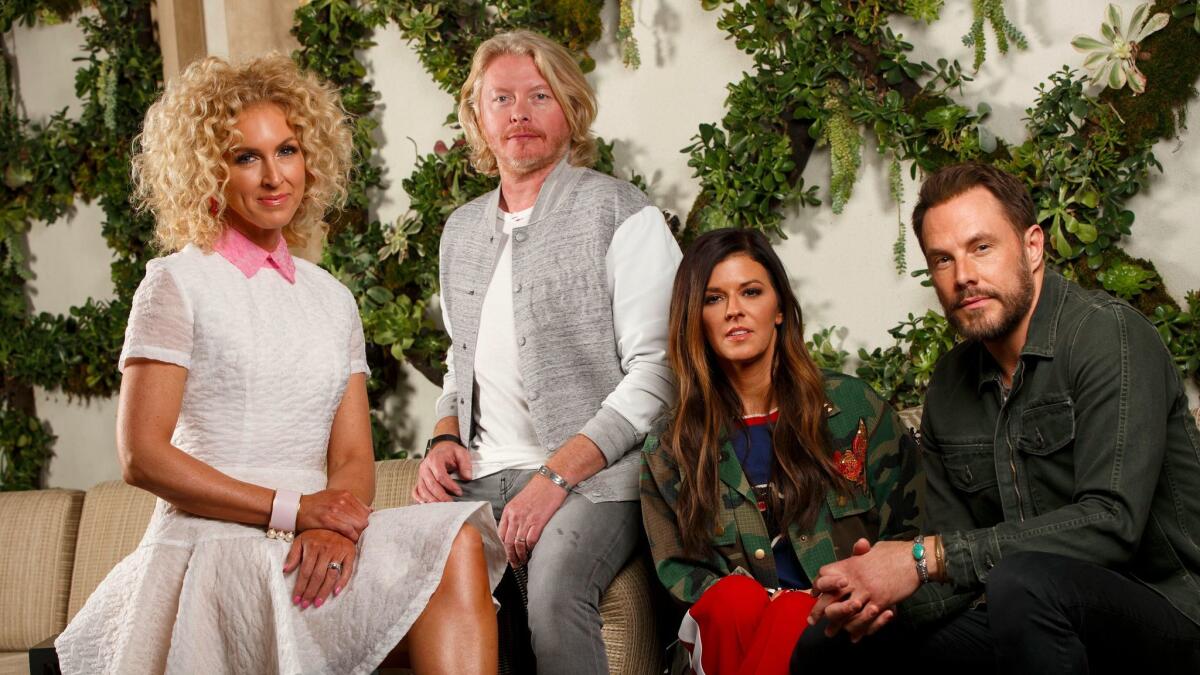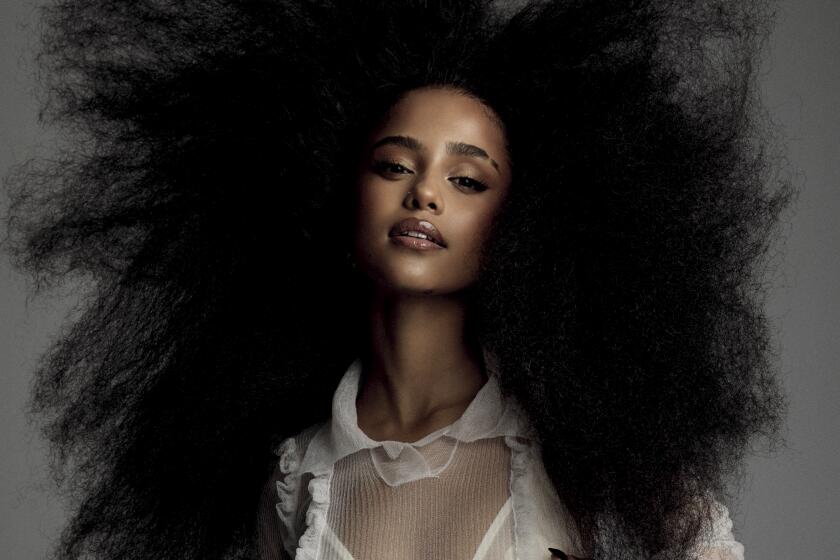Why Little Big Town went ‘hillbilly Sade’ to follow up ‘Girl Crush’

Only three acts performed more than once at this month’s Grammy Awards.
One was Adele, who opened the night with “Hello” and then paid tribute to the late George Michael. Another was Bruno Mars, who sang his song “That’s What I Like” as well as Prince’s “Let’s Go Crazy.”
The third was Little Big Town.
According to the band’s manager, it was not so many years ago that the country quartet had trouble scoring even a presenting spot at one of music’s many awards shows. But at the Grammys, Little Big Town took part in an elaborate salute to the Bee Gees and introduced Katy Perry by singing her “Teenage Dream” in the group’s signature four-part harmony.
“What a great song,” the band’s Karen Fairchild said the next afternoon. “And to get to slow it down and make it more folksy?”
“It was dreamy,” her band mate (and husband) Jimi Westbrook added with a laugh.
That ample screen time reflects Little Big Town’s surge in popularity since the 2016 Grammys, where its sly crossover hit “Girl Crush” — about a woman’s envy for her ex’s new lover — was nominated for song of the year. (This year the show’s producers originally wanted the group to do Perry’s “I Kissed a Girl,” an idea Fairchild wasn’t crazy about.)
Yet the dual performances also demonstrated Little Big Town’s uncommon flexibility — the ease with which the band moves between styles even as those closely braided voices keep its music rooted in a down-home Southern tradition.
You get more of that from the group’s excellent new album, “The Breaker,” out Friday. Produced with textured precision by Little Big Town’s most trusted collaborator, Jay Joyce, the record starts with the funky, uptempo “Happy People” before switching gears for the hard-hitting “Night on Our Side” and the album’s lead single, “Better Man,” a plaintive ballad written by Taylor Swift that recently topped Billboard’s country chart.

Then there’s the hoedown-ready “Drivin’ Around” and “Lost in California,” a slow-motion stunner about looking for escape on “some deserted piece of virgin sand.”
Of the latter, Fairchild said, “I think of it as ‘hillbilly Sade,’” referring to the famously seductive soul singer, and there is something of an R&B vibe to the song that makes it feel like a natural follow-up to “Girl Crush.”
Written by the successful Nashville trio of Hillary Lindsey, Lori McKenna and Liz Rose (who reteamed for “Lost in California”), “Girl Crush” brought Little Big Town to the attention of non-country fans drawn to the song’s luscious melody and its seeming endorsement of same-sex romance. Yet the openly sensual words — “I want to taste her lips / Yeah, ’cause they taste like you” — inspired a backlash from some conservative country listeners who claimed to be offended by the song’s relatively edgy message.
“They definitely take chances,” Lindsey said of the group, which formed in 1998 when Fairchild and Kimberly Schlapman, friends from college, recruited Westbrook and Phillip Sweet.
Gathered last week in Beverly Hills, the musicians displayed little damage from the experience, saying the controversy only helped to broaden an audience that had been slowly growing since Little Big Town’s first No. 1, the cheeky 2012 hit “Pontoon.”
“It introduced us to people that never would’ve heard us otherwise,” Schlapman said of the hubbub.
Last summer Little Big Town tried to capitalize on that exposure with “Wanderlust,” a surprising, deeply quirky collaboration with Pharrell Williams that blended the group’s complex harmonies with the producer’s slick electronic beats.
“Once you’ve had that kind of connection, of course you want more,” Fairchild said.
The experiment didn’t pay off, at least not commercially: According to Nielsen Music, “Wanderlust” has sold 9,000 copies, compared with more than half a million for the band’s 2014 disc, “Pain Killer.”
But the band members insisted that working with Williams in Los Angeles, where they rubbed shoulders with pop stars including Mars and Justin Timberlake, was crucial preparation for making “The Breaker” — for recording “with no boundaries on how to create a melody or what kind of groove to lay that melody into,” Sweet said.

Fairchild was quick to add that the band’s process with Joyce, known for his work with Eric Church and Cage the Elephant, is different from the touchy-feely atmosphere Williams inspired.
“I don’t think Jay believes in Jesus or Santa Claus,” she said, laughing. “So if sometimes you have an emotional attachment to something, you’ve got to sell him on it. There’s a push and pull there. But it makes for good records.”
Indeed, for all the sounds and attitudes that Little Big Town freely lifts from other genres, “The Breaker” feels identifiably country in the way that it balances that cosmopolitan streak with a commitment to more elemental truths: family, religion, an “accent from your hometown,” as Fairchild puts it in “Free.”
Jason Owen, the group’s manager, said that ability to look outward and inward at the same time is one reason Little Big Town has become an avowed influence for many of Nashville’s younger acts, including another of his clients, the progressive but nostalgic Kacey Musgraves.
And it’s what’s drove the band back to Music City following the Grammys for a run of concerts at the Ryman Auditorium scheduled to begin Friday.
“That place, it represents such history,” Sweet said of the historic venue, often described as the “mother church” of country music. “The soul that lives in there, it’s like you can feel it.
“So to go there and play these songs? Man, that’s a spiritual moment.”
Twitter: @mikaelwood
ALSO
Kacey Musgraves is not here to flatter your progressivism
Meet Busbee, the producer who helped Maren Morris get to the Grammys
How Little Big Town’s ‘risky’ ‘Girl Crush’ went from a pajama party to the Grammy Awards
More to Read
The biggest entertainment stories
Get our big stories about Hollywood, film, television, music, arts, culture and more right in your inbox as soon as they publish.
You may occasionally receive promotional content from the Los Angeles Times.











